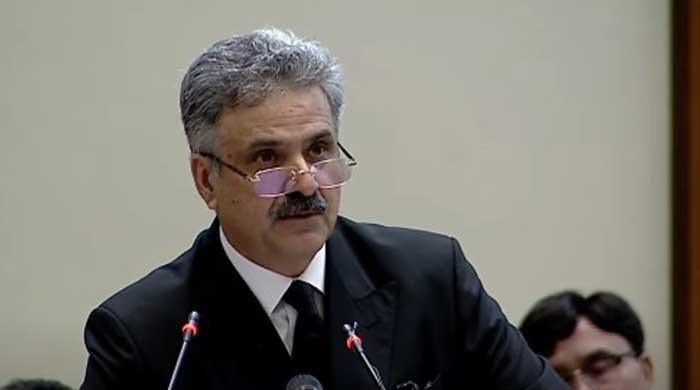- The supreme judicial council decided 64 complaints against the judges: CJP.
- Says that the case management system ensures rapid elimination of pending cases.
- Add the NJPMC meeting on October 17 to review the missing people, key questions.
The chief judge of Pakistan (CJP), judge Yahya Afridi, announced that the Supreme Court will soon begin to plan business using artificial intelligence, but at the same time, he recognized that the judiciary was “not entirely ready” for its immediate use.
Addressing the judicial conference in Islamabad on Monday, who attended the judges of the Supreme Court and the High Court, the Attorney General of Pakistan (AGP) Mansoor Usman Awan, and representatives of Pakistan Bar Council and the association of the Supreme Court, the highest judge stressed that the new legal year is not a memorial.
“The purpose of the ceremony for the new judicial year is to review our performance,” he said, recalling that tradition had started in the 1970s and had taken place regularly since 2004.
He said that transparency in the judicial system would guarantee justice and underline that the elimination of rapid cases and technology -oriented reforms were at the heart of his vision of an effective judicial system.
Judge Afrida said that by assuming his duties, he had felt the need for reforms and initiated them on five fundamental pillars. “We have prioritized technology to improve services, transparency in cases and strengthening the legal framework,” he noted, adding that case management systems had been introduced to ensure the timely elimination of cases.
He announced that the Supreme Court was heading for a paperless system. “Case registration, case files and copies of judgments have already been made available online, and the court will work on a completely digital system,” he said. “The electronic services have been launched and a facilitation center will become fully functional on October 1 to serve the litigants.”
The chief judge revealed that the Supreme Judicial Council (SJC) had decided on 64 complaints against the judges, while 72 were under study and 65 cases remained waiting. “The other cases will be distributed between the judges by the end of this month. We follow the principle of first arrival, first served and will not take the cases at the bottom of the list,” he said.
Stressing the importance of technology, he said: “Everyone talks about technology and artificial intelligence (AI). We are scanning 61,000 files digitally, and the project will be completed in six months. Cases will be planned via artificial intelligence, although we are not yet fully ready for its immediate application.”
Judge Afrida said that internal audit procedures had been completed and that rules were shared with comments for comments. “We have summoned a complete justice meeting to examine the rules. Members having objections should submit them in writing so that they can be duly taken into account,” he added.
He also clarified the rules concerning the leave of the judges, claiming that during the judicial holidays, no authorization was required, although the holidays outside the holidays are compulsory.
Discussing the security measures, the chief judge said: “Security for me and other judges has been reduced. The protocol in the red zone has been reduced. Judges may require security outside of Islamabad, but not in the red zone. ” He said he had reduced his security vehicles to nine to only two.
Judge Afrida stressed that he had made distant tours to examine the justice system and asked that the questions of the entire judiciary across the country be resolved. He announced that the National Committee for the Development of Judicial Policy (NJPC) would meet on October 17 to examine key issues, including missing cases.
Pakistan Vice-President Bar Council, Tahir Nasrullah, in his speech, paid tribute to the Afridian chief judge and recognized recent initiatives aimed at facilitating litigants, including the supply of the Internet and solar energy installations in remote areas and the practical use of audiences of video links.
He added that the affairs awaiting the Supreme Court had decreased and expressed the hope that access to justice would still be improved at the judicial level of the district.
The president of the association of the Supreme Court Bar, Rauf Atta, also praised the chief judge for having introduced a new vision of the Supreme Court, citing achievements such as electronic deposit, video liaison hearings and the creation of a facilitation center.
He appreciated that the court continued the hearings even during the summer holidays, although he expressed his concerns concerning delays in the event that planning and asked for other steps to facilitate the process of litigants.
The Attorney General Mansoor Usman Awan, in his remarks, said that the benefit of justice remained the absolute priority of the judiciary and that membership of the Constitution and the law guaranteed transparency.
He appreciated the reduction in affairs in relation to the previous year and congratulated the judges and officers of the Supreme Court. He also supported the use of technology and artificial intelligence to improve legal efficiency.




